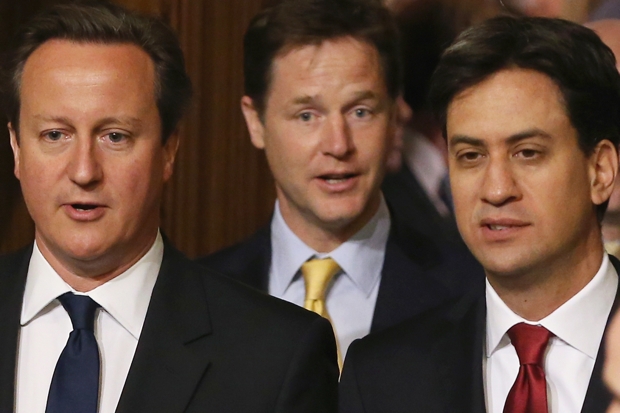It’s another election Monday and the three parties are still hanging about in their comfort zones, even though they appear to have moved on to other topics.
David Cameron is talking about the economy, but with a softer, nicer-sounding edge that has riled some on the Left because it involves him talking about full employment, which is something Beveridge was a fan of, and pay rises, which is something Labour says it wants more (while backing the public sector pay freeze).The Prime Minister will give a speech promising to expand the start-up loans to help 50,000 more entrepreneurs set up business using a £300 million pot. The Prime Minister wants to paint his party as ‘the party of small businesses. We’re the party of the roofers and the retailers; the builders and the businesswoman.’
Nick Clegg is talking about mental health, one of the key themes of his general election campaign not least because it polls incredibly well with Lib Dem target voters. And Ed Miliband is talking about mental health too. For mental health campaigners who have complained for years about a Cinderella service that politicians only take a passing interest in, it must be thrilling to see this issue becoming the subject of political fights, with Luciana Berger claiming on the Today programme a few minutes ago that her leader cared more about mental health and had made the first speech on it in 2012 (though to be fair to Clegg, he did talk about mental health before going into government). Labour wants to talk about mental health because it works well with the party’s general focus on the NHS, which it sees as vital to shoring up support not just amongst its core but also with the general voting public, given the NHS consistently appears in the top three issues that people name as most important to them (though ComRes found at the weekend that 49 per cent of voters think Miliband is using the NHS to his advantage, which suggests that the Labour leader was wrong to let the ‘weaponise’ row rumble on). Oh, and both men are making their latest mental health announcement because it is something called ‘Blue Monday’, which doesn’t actually exist but is a handy hook for whoever plans the Lib Dem and Labour grids.
The sum effect of the announcements, accusations and rebuttals may well be that voters just hear politicians shouting about who is the biggest liar, which is enough to make Blue Monday a real thing. The same ComRes poll found that 39 per cent of voters were already bored with the news about the General Election – which the parties won’t read as a sign that they need to take at least one Monday off between now and 7 May, but that their repetitive messages are only just starting to break through to voters.







Comments